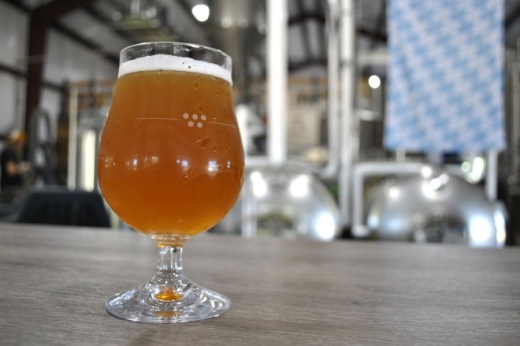UPDATED
Breweries may not have customers consume alcohol on patios, according to clarified guidance released July 22 by the Texas Alcoholic Beverage Commission.
The new guidance with expanded language comes five days after the TABC initially sent out guidance for a temporary modification of licensed premises for retail and manufacturing businesses to expand their premises.
Several breweries statewide began opening patios and outdoor areas for customers to drink beers they had purchased to-go without table service. The TABC now states that is not permitted.
“Breweries or any other manufacturing-tier members whose alcohol sales comprise 51% or more of their gross receipts may not allow customers to consume alcohol on the premises, even if the area in which they’re consuming the alcohol isn’t included on the business’ license,” said Chris Porter, public information officer for the TABC, in an email to Community Impact Newspaper. “The guidance in general is intended to allow permittees to expand their licensed premises in order to increase outdoor seating and similar areas. However, businesses which exceed the 51% for alcohol sales such as bars and most breweries may not allow on-premise service.”
ORIGINAL POST
Nearly one month after Gov. Abbott mandated bars close again in a move to soften the surge of coronavirus cases statewide, breweries across Texas may now partially open patios for service again.
Last week, the Texas Alcoholic Beverage Commission issued an option for temporary license modifications for breweries across the state. This means that breweries can now exclude patios and outdoor beer gardens from their on-site premises, allow guests to purchase their product to go and then have the guests drink on that patio.
Charles Vallhonrat, executive director of the Texas Craft Brewers Guild, said he and other brewers have not received any follow up materials from the TABC since July 17.
"I'm getting messages from some of our brewers that there is confusion," Vallhonrat said. "People are making last-minute decisions on how to manage their business based on something that came out on Friday afternoon. ... I would hope for a little more clarity."
Breweries statewide were forced to close in-house service after Abbott on June 26 mandated bars close to stop the spread of coronavirus.
“Craft breweries are not bars, but, as written, the majority of taprooms fall under the order and will therefore have to temporarily cease operating, once again leaving beer-to-go sales as a critical revenue stream,” said Vallhonrat in an email to Community Impact Newspaper at the time. “The health and safety of all Texans is paramount and we support taking the appropriate steps to stop the spread of coronavirus in Texas, yet we are disappointed ... that a more refined solution could not have been found.”
This move from TABC comes one week after Saint Arnold Brewing Co. in Houston was forced to close the outdoor patio at its Beer Garden & Restaurant. The state identified the restaurant as a bar after including Saint Arnold’s beer sales to distributors in its total income, according to the brewery. Those sales tipped the Beer Garden & Restaurant into being considered a bar instead of a restaurant.
“Sometimes government bureaucracy comes to ridiculous conclusions. This is one of those times,” Saint Arnold founder and brewer Brock Wagner wrote in a social media post.
Now, Saint Arnold may be able to apply for a temporary license modification that would exclude the patio as part of the bar.
Some breweries across Texas have already made the switch.
Oddwood Ales, located off Manor Road in East Austin, has opened its patio as a result of the allowance of temporary license modifications.
According to a post on the brewery’s social media pages, customers must order beer through Oddwood Ales’ web store, which will then be delivered out to the customer’s car. Customers then have the option to drink those beers on the brewery’s patio. The brewery is not providing table service, but it is offering cups, masks and sanitizers for any guests on the patio.
In early July, some state officials called on Abbott to modify his June 26 order to exclude breweries.
Texas Agriculture Commissioner Sid Miller issued a statement July 3 calling on Abbott to make exceptions for the taprooms and tasting rooms of the state’s breweries, distilleries and wineries. Miller said each of those industries were vital to Texas’ farming business.
“When breweries and distilleries suffer, we are losing more than just Texas products,” Miller wrote. “Beyond the impact on agriculture, closure of tasting rooms and taprooms will have a damaging downstream effect on glass manufacturers, trucking and marketing and advertising sectors among other jobs supported by this industry.”
Prior to the June 26 shutdown order, some breweries in Texas had renovated their spaces to include patios. Two breweries in North Austin, 4th Tap Brewing Co-Op and Hopsquad Brewing Co., added or moved tables to their outdoor spaces to maintain social distancing between customers and staff. Further, breweries purchased sanitizer, cleaning supplies and installed contactless purchasing systems in preparation for reopening.
“We’re fortunate enough to have a pretty big parking lot. ... We can spread out a good 10-12 tables out there,” Hopsquad founder and brewer Alex Limon said in mid-May.
BREWING TROUBLE
Breweries across Texas continue to ask state leaders to relax regulations as the industry continues to struggle through the coronavirus pandemic.
On July 20, the Texas Craft Brewers Guild released the results of a survey it conducted to study the continuing economic impact of the pandemic on Texas’ breweries. The survey, which collected responses from 87 breweries, found that one in three craft breweries indicated they will have to cease operations in the next three months if nothing changes to the current shutdown order or if no new economic relief options become available.
Of the responding breweries, two of three reported they will not be able to remain open through the end of the year under current conditions.
The trade group is now asking Abbott to allow Texas craft breweries to operate under the same on-site service protocol as restaurants statewide.
“The arbitrary guidelines laid out in Gov. Abbott’s June 26th executive order affecting 51% establishments forced the vast majority of breweries to close their taprooms and rely on beer-to-go and package sales,” said Josh Hare, Texas Craft Brewers Guild board chair and founder of Hops & Grain Brewing, in the organization’s July 20 news release. “Unfortunately, that business model is not sustainable for most breweries, large and small, with the smallest breweries impacted the most due to their dependence on their community-centric taproom model. It’s had a decimating effect on the industry.”
According to the Texas Craft Brewers Guild’s most recent survey, 20% of breweries in the state are currently experiencing year-over-year revenue losses of 80% of more.
In April, a Texas Craft Brewers Guild survey found that Texas breweries were seeing an average 71% decline in revenue during the pandemic.
Several breweries have already had to shutter their doors since March as the economic impact of state mandated shutdowns has taken its toll.
Northwest Austin’s North by Northwest Brewing Co. was the city’s first casualty of the pandemic. The brewery closed its doors in late April after two decades of business.
By the Texas Craft Brewers Guild’s own count, at least six breweries have permanently closed as a result of the coronavirus pandemic.
"Our members were obviously having to deal with the new situation when the first shutdown happened. ... They were worried about the future of their business. The second time around it feels a little bit more dire because it is so open-ended," Vallhonrat said July 21. "I'm feeling just more existential concern."





